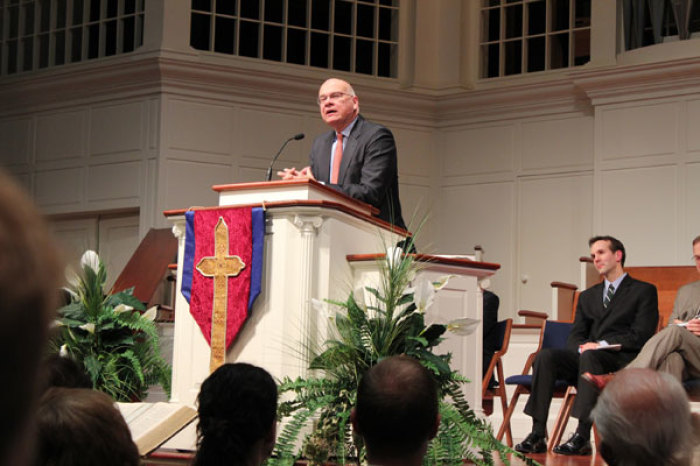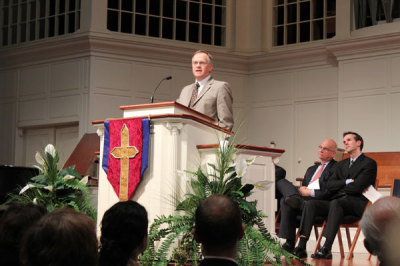Tim Keller: John Stott First to Speak God's Word to Me

WHEATON, Ill. – Under the slated skylight and within the clean, airy white walls of College Church on the Wheaton College campus, more than 600 people gathered Friday to remember and be inspired by the life of John Stott – the English Anglican clergyman who helped define and drive the global evangelical movement in the 20th century.
One by one, speakers eloquently, but with much sincerity and humor, recalled the humble, intellectual giant of the evangelical community who astounded and touched Christians around the world with his clear and authoritative exegesis of the Bible, and with the way he lived his life.

“He (John Stott) truly was, in some ways, the first person who spoke the word of God to me through his literature and I also heard him in person,” proclaimed Tim Keller, senior pastor of Redeemer Presbyterian Church in New York City and whom Newsweek magazine described as a “C.S. Lewis for the twenty-first century.”
Keller delivered the sermon at John Stott’s U.S. memorial service Friday and shared that Stott’s bestselling book, Basic Christianity (1958), which has sold well over a million copies and has been translated into 25 languages, had a “profound informative influence” on him.
“Therefore, I needed to rethink. I need to do what Hebrews 13:7 says I should do. I need to rethink my life in light of the results of his (Stott’s) life,” recalled Keller about his thinking several months ago when he was invited to speak at Stott’s memorial service.
Stott, who passed away peacefully in Surrey, England, on July 27 at the age of 90, is often described as the architect of the evangelical movement in the 20th century, and was the chief drafter of The Lausanne Covenant (1974), the evangelical manifesto on evangelism and theology.
He is the author of over 50 books translated into 65 languages, and was named by Time magazine in 2005 as one of the “100 most influential people” in the world.
But despite the influence and recognition he received during his life, Stott is remembered for his humbleness and dedication in serving the Lord.
“The greatest gifts in John’s life were not his talents, it was actually his character,” remarked the Rev. Dr. Mark Labberton, a former study assistant of Stott who is now a professor at Fuller Theological Seminary in California.
Keller, who said he read six volumes on the life of John Stott over the past two months, stated that he uncovered five findings about Stott’s life that should make Christians rethink their own life.
First, Christians should be convicted by Stott’s Kingdom vision and zeal for God’s Kingdom.
“Everything I have read, known, and by all accounts, John Stott’s motives were about as pure as a human being’s motives can be,” asserted Keller. “He was not an ambitious man for his own glory. He did not want power. It was obvious he did not want status. He did not want wealth, he gave it away."
“But there was something driving him,” said the influential American preacher.
Although Stott was considered the greatest student evangelist of his generation and foresaw the rise of Christianity in the global South before most anyone else, he was not satisfied with his accomplishments.
“Here is my point. Most of the rest of us would be very happy being told you are the best. You are the best preacher, you’re the best of this or that. But he didn’t care about that. He wanted to change the world for Christ,” Keller explained. “I looked at his motives, I looked at his labors, how he spent himself, and how he gave himself. Why wasn’t he ever satisfied? It really was not worldly ambition. He really wanted to really change the world for Christ. We should be convicted by that.”
Stott’s life, according to Keller, should also make Christians reflect on their cultural learning curve in terms of the cultural blinders on their eyes, and believers should be chastened by his leadership controversy. If even a man as gracious as Stott could not avoid controversy and fall-outs with other Christian leaders, people should “realize that it (controversy) is going to happen. If you want to do something for Christ, someone will be mad.”
Keller also found that Stott was a great innovator, including his reinvention of expository preaching, invention of the modern city-centered church, his role as a Christian statesman who uses institutions to further the work of God, and his forcing evangelicals to deal with social justice issues.
Finally, the evangelical scholar, while studying Stott’s life, found that the English clergyman essentially created evangelicalism, which Keller sees as “the greatest center between fundamentalism and liberalism.”
The Rev. Dr. Christopher Wright, the so-called “successor” of Stott and the international director of Langham Partnership in London, remarked that Stott was way ahead of his time.
“From the early stages of his ministry, he reached out to the whole world. Starting here in the United States, his first international trip, and so many other countries … his thinking, his world was global,” said Wright. “Long before the Internet, John Stott had created a world wide web from relationships and friendships and ministries. Long before the iMac, or the iPhone, or the iPad, there was iFrances (Stott’s long-time secretary), reaching out to the world on behalf of John, by letters, faxes, and eventually, through emails.”
Dr. Joshua Moody, senior pastor of College Church, recalled Stott saying decades ago to a group of undergraduate students that included himself, “If I had to live life over, I would live for Christ.”
After a pause, Stott added, “You know, if I had to live a thousand lives, I would live them all for Christ.”
“We come here to honor a man whose preeminent purpose is to honor Christ,” declared the pastor of the host church of the U.S. memorial service for John Stott.
Did You Know:
Stott daily woke up at 5:00 a.m. to read the Bible and pray for hundreds of people before breakfast. For over 50 years, he would read the entire Bible annually.




























